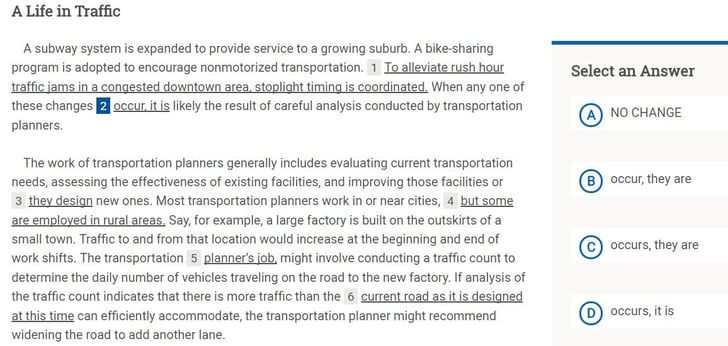Should I take the ACT or the SAT? This is one of the most common questions students have when they begin to consider the college application process.
SAT/ACT English: A Common Language
 As the ACT has come into its own over the past 10-20 years as a fully recognized college admissions test alongside the SAT, students increasingly weigh both of these exams to assess which one may be better suited for them, sometimes opting for both. Preferences (and rumors) abound, of course: “There are too many trick questions on the SAT math!” or “I'd take the ACT, but the science section is a deal-breaker!” While these sentiments may (or may not) be true, depending on the student, what's certainly true is that they contribute heavily towards apprehension over which test to take! There is, however, one section that is nearly identical on each test, and offers a way to kill two birds with one stone in your college admission exam prep. That's the grammar/rhetoric section, referred to as the “English” section in the ACT, and the “Writing and Language” section on the SAT. CollegeXpress offers an in-depth analysis of the similarities and differences between the two tests.
As the ACT has come into its own over the past 10-20 years as a fully recognized college admissions test alongside the SAT, students increasingly weigh both of these exams to assess which one may be better suited for them, sometimes opting for both. Preferences (and rumors) abound, of course: “There are too many trick questions on the SAT math!” or “I'd take the ACT, but the science section is a deal-breaker!” While these sentiments may (or may not) be true, depending on the student, what's certainly true is that they contribute heavily towards apprehension over which test to take! There is, however, one section that is nearly identical on each test, and offers a way to kill two birds with one stone in your college admission exam prep. That's the grammar/rhetoric section, referred to as the “English” section in the ACT, and the “Writing and Language” section on the SAT. CollegeXpress offers an in-depth analysis of the similarities and differences between the two tests.
While the SAT and ACT versions of this section aren't exactly the same—the ACT asks you to answer 75 questions in 45 minutes, while the SAT gives you 35 minutes to answer 44 questions, the overall content is very similar. In each, you are asked to read passages and answer questions that are divided, broadly, into grammar/syntax questions (these may include concepts such as tense, punctuation, word choice, conjunctions, and simple transitions) and questions that deal with issues such as rhetoric, conciseness, form, editorial content, or logical flow. On the SAT, there are occasional charts or graphs that may be accompanied by simple data interpretation questions.
On each of these tests, you can go right to the questions without an initial read-through of the passage (note: this is the opposite of how you should handle Reading Comprehension type questions). Learn to recognize simple, straightforward grammar questions, like this one from a College Board's sample SAT:

This question could easily occur on either the SAT or the ACT. It tests you on punctuation and subject/verb agreement (any one...occurs), and only requires a little bit of reading for context (read a sentence or two above and below the tested material to be on the safe side). The answer is D, and you can move on pretty quickly. Other questions are a bit more involved, and require more focus on context and flow. Here's an example from a practice ACT exam:

(question sample from Guthrie Public Schools, OK)
Here, you need to read the entire paragraph (and, ideally, the transition into the next one) to understand how best to interpret and arrange the sentences in the passage. In this case, B is the best answer, since “stars” are revealed as darkness falls. The “deeper truth” in that sentence flows into our need for understanding, the focus of sentence 2, which should be moved to the end. (For more ACT specific strategies, check out these strategies from Brightstorm.)
Both the SAT and ACT are also concerned with conciseness—any extraneous or redundant words or phrases are frowned upon, and often the simplest-sounding choices are the correct answers. Both of these tests are designed to gauge your ability to recognize clearly structured (rather than creative) writing, so issues such as wordiness, overuse of passive voice, or awkward phrasing tend to lead to incorrect answers. These are also traps to be aware of when writing your own essays—whether for the essay sections of these exams or more generally!
Whether you're getting ready to take the SAT, or ACT, or both, recognizing that the English/Writing sections are similar can help you to get a leg up on your test prep. Not only does this bit of information allow you to tackle both of these at once, but it can inoculate you against unwanted surprises, now that you know that each test is looking for almost the same thing. If you know your basic grammar, remember to read for context, and focus on asnwers that are concise and logically consistent, you'll do just fine on Test Day.
About the Author
Steve Markofsky is one of our most experienced and qualified test prep tutors. For more information on ACT/SAT tutoring and to see profiles of tutors like Steve, click here.
